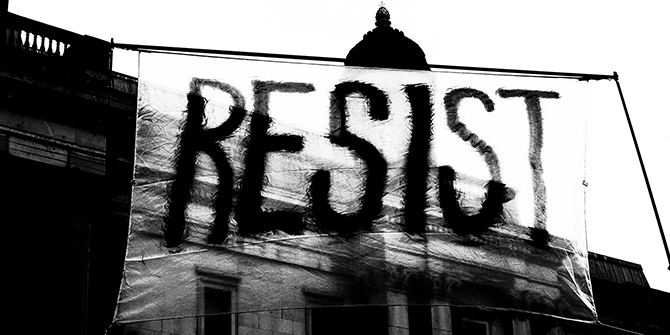
We ask Professor John Chalcraft, PhD candidate Temi Ogunye and undergraduate student Haydon Etherington to reflect on protest and its ability to effect social and political change.
Protest ‘works’ when it empowers subordinated groups and weakens existing forms of hegemony
 Does protest work? I cannot answer this question in 500 words, but I can signpost some elements of a postcolonial, Gramscian approach to studying it.
Does protest work? I cannot answer this question in 500 words, but I can signpost some elements of a postcolonial, Gramscian approach to studying it.
This approach rejects the conservative and (neo)Orientalist view, in which protest is irrational and dysfunctional.
The approach I have in mind defines protest as popular self-activity. This involves praxis: historically-situated conscious activity which challenges subordination and produces new values and social relations.
This activity is popular because it is thoroughly rooted in the experiences and struggles of a diverse array of subaltern social groups: workers, women, colonial subjects, and sexual, religious, racialized and national minorities inter alia.
These optics are postcolonial as they do not privilege the working class as the sole emancipatory subject, and reject economistic, authoritarian, masculinist and Eurocentric forms of Marxism.
Popular self-activity does not express some pre-existing, romanticized subaltern essence, as in the true, authentic people or ‘pure community’ of populism and fascism. But nor is it directed by an omniscient, rational Vanguard, as in phallocentric, instrumentalist Leninism.
Popular self-activity involves a long, collective labour, born of oppression and alienation. The idea is that the violent contradictions of existing hegemony are most acutely played out on the bodies of subaltern social groups. The latter struggle to understand and change their conditions, but these conditions cannot be fully understood or changed through hegemonic concepts and practices, which only reproduce them. Popular struggles of all kinds thus generate alternative conceptions of the world. These conceptions include a higher, critical consciousness of the traces, contradictions, constraints, and channels of existing forms of hegemony and domination.
These new conceptions form the basis for new forms of collective will, i.e. new collective desires, demands, goals, and forms of historical and political protagonism. New forms of collective will are expressed in various kinds of organization (parties, community organizations, campaign groups etc). Organizations try out new conceptions in practice, determining a ‘line of collective action’ (tactics and strategies). They forge alliances with other actors and organizations, working through differences and discovering new commonalites.
Protest ‘works’ when it acts to develop agency among subordinated groups, weakens and disaggregates existing forms of hegemony, and, above all, ameliorates or eliminates existing forms of subalternity.
Popular self-activity is especially capable of working when it achieves the organic articulation of the differentiated elements that comprise its (potential) unity. These differentiated elements include: subaltern social groups and forms of leadership, the economic-corporate and the ethico-political, passionate immediacy and knowing abstraction, the content of the collective will and the form of organization (including spontaneity and planning, the horizontal and the vertical), strategic/tactical means and movement ends, and, ultimately, superstructure and base, theory and practice.
Protest works when it successfully weaves together these differentiated elements in a living, plural, unity or historical bloc – a complex warp and weft which produces new values and social relations. Bloc formation draws on feminist and queer sensibilities, the intellectual labour of ‘organic intellectuals’, and on radically democratic processes, which together furnish new concepts and enable in practice the sensitive and complex endeavour of working through differences and discovering commonalities.
These optics reject positivism, determinism, relativism, and idealism alike. They embrace historicization, interpretivism, and the study of active, human subjectivity and practical activity. They suggest important methodologies such as oral history, ethnography, and participatory action research. They steer us away from mainstream social movement theory, which is too often uncritical and ahistorical, and offers too little to existing political struggles. Rather, postcolonial Gramscian optics orient us to thought and action that changes the world. Indeed, when protest doesn’t work, we academics and commentators might well ask how we ourselves are responsible through our own analysis and activity.
John Chalcraft is Professor of Middle East History and Politics in the LSE Department of Government and author of ‘Popular Politics in the Making of the Modern Middle East’.
Protest takes many forms, we should think about when and why it achieves its aims
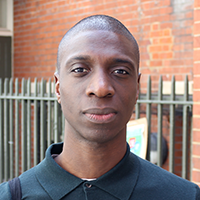 2018 marked 100 years since the movement for women’s suffrage secured some women’s right to vote in UK parliamentary elections. And this year is the 30th anniversary of the Tiananmen Square Massacre in which the Chinese state used lethal force to crush a student-led demonstration advocating democratic reform. These anniversaries suggest a simple but frustrating answer to the question ‘does protest work?’ – ‘sometimes; it depends’. There are at least two reasons why this question yields such an answer. One has to do with the word ‘protest’, the other with the word ‘work’.
2018 marked 100 years since the movement for women’s suffrage secured some women’s right to vote in UK parliamentary elections. And this year is the 30th anniversary of the Tiananmen Square Massacre in which the Chinese state used lethal force to crush a student-led demonstration advocating democratic reform. These anniversaries suggest a simple but frustrating answer to the question ‘does protest work?’ – ‘sometimes; it depends’. There are at least two reasons why this question yields such an answer. One has to do with the word ‘protest’, the other with the word ‘work’.
To protest is “to express disapproval or dissent; to object to something”. This covers an extremely broad range of activities: from the petition objecting to Donald Trump being offered a state visit to the UK, to Trump’s decision to bomb a Syrian military facility in response to the Syrian government’s use of chemical weapons. When thinking about whether ‘protest works’, these diverse activities should not all be considered under the same heading.
One distinction worth making is between legal and illegal protest. The former is more likely to achieve the protesters’ objectives in situations where dissent is permitted and the wider community is hospitable to it. A free and fair election is a good example of this. It offers an opportunity to object to a policy, government, or entire political class. We are familiar with the concept of a ‘protest vote’, after all. Illegal protest, on the other hand, may be deemed necessary when the wider community is deaf to the activists’ concerns. As Martin Luther King Jr. said of civil disobedience: “It seeks so to dramatize the issue that it can no longer be ignored.”
Another distinction worth making is between violent and nonviolent protest. Some have argued that campaigns of nonviolent resistance have been more likely to achieve their stated goals than violent ones, and so the latter can rarely be justified on strategic grounds. But, even if you accept this empirical claim, many would still agree that the campaign of sabotage led by Nelson Mandela against Apartheid, for example, was legitimate. This suggests that not all grounds for justifying protest are straightforwardly strategic (and not all violence is the same). Which brings us to ‘work’.
One way for protest to work is for it to achieve legislative or policy change. But this is not the only way. Protest may aim to express disapproval and nothing more. The 2011 riots in England might be viewed in this way. Protest may seek to change perceptions or challenge a narrative, as a recent campaign objecting to the under- and mis-representation of black people in British film does excellently.
Protest might also intend to rally, inspire, or raise the consciousness of a community, perhaps with a view to building strength for future campaigns. The #MeToo and Black Lives Matter movements are potentially good examples here. The general point is that ‘work’ should be understood in a dynamic way: protest can create the conditions for concrete change to take place in the future even though it may not be likely now.
‘Does protest work?’ is too broad and simplistic a question to answer sensibly. Instead we should ask: ‘what kinds of protest work when, and why?’ And more importantly: ‘what do we want this act of protest to do?’
Temi Ogunye is a PhD Candidate in the LSE Department of Government. His research focuses on social justice, resistance and activism.
Protest might not change the policy of today, but it may shape the politics of tomorrow
 Look at a list of government U-turns caused by demonstrations and you will be disappointed. For protesters, recent British history has been a timeline of failure, punctuated by the occasional front-page splash.
Look at a list of government U-turns caused by demonstrations and you will be disappointed. For protesters, recent British history has been a timeline of failure, punctuated by the occasional front-page splash.
We went to war in Iraq, tuition fees are more than £9000 a year and we are leaving the EU. In fact, one of the few movements that prompted policy change over the last 30 years was the Poll Tax riots – hardly the ideal peaceful protest.
But this misses the point. Thousands of Britons take to the street every year, not all of them expecting the government to change tack. My own participation in last year’s anti-Trump march wasn’t in expectation that May would reject his visit, but that the rest of the world knew he was not welcome.
The success of protest does not often come from influencing the top – but engaging the rest of society. Through media coverage, protests can affect electoral attitudes and shape our collective memories.
During the ‘People’s Vote’ protest in October the campaign received much greater interest than it had experienced up to that point. UK search trends highlight the power of a well-organised march. On the day of the protest, the movement even overtook Theresa May in number of online searches.
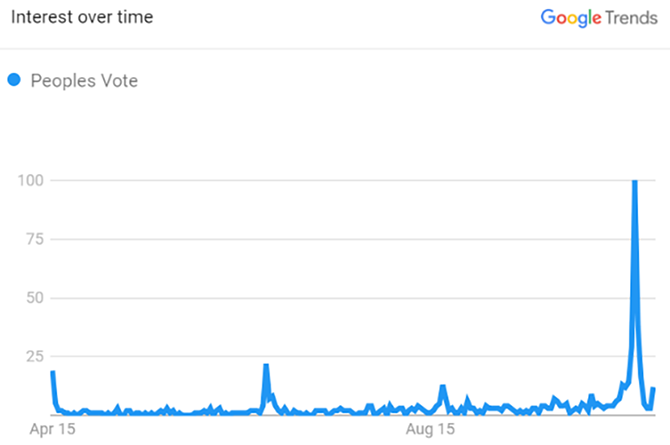
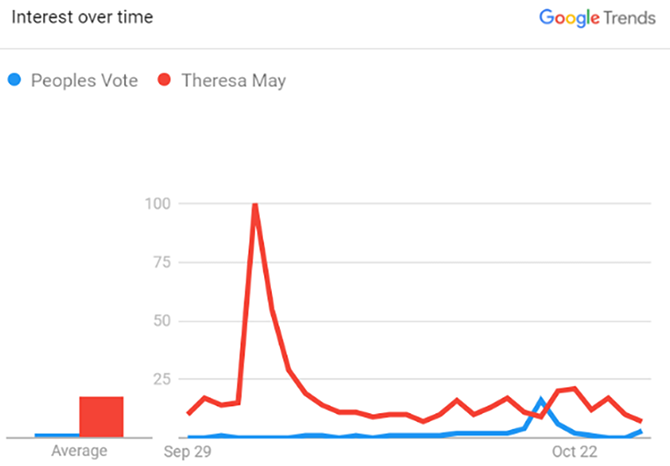
The effects of such newfound recognition should not be underestimated. In America, Tea Party protests were found to influence electoral results and even some incumbents’ policy platforms. Owing to media coverage, an expansion of political networks and a boost to local organising, the vote count for the Republican Party was found to increase by between seven and fourteen votes for every protestor. Even if protest is unreliable in shaping specific policies today, it can change who shapes policy tomorrow.
As Professor Michael Bruter covers in his research, recollection of events like protests can also shape our political outlook. The Atkinson and Shiffrin model of memory splits our memory into visual, auditory and haptic; in other words, what we see, what we hear or say, and what we feel.
When recalling elections, few people remember their vote. Instead, when asked how they voted, people ‘remember’ their current voting intention.
People do remember events over an election period, however. These may be heated arguments across the dinner table, an image of a flustered politician or an unexpected exit poll.
The visual nature of demonstrations ensures that they are built into our memories, alongside events and important elections. Voters across the country are therefore bound to remember images of protest in the media or discussing a demonstration with a friend.
Think of the Iraq War or tuition fees – many of the images that come to mind are of protest. If an individual can’t remember what their position was at the time, such visual memories are a key touchstone in establishing current opinion.
As you head to your next protest, placard in hand, don’t feel downtrodden if the government doesn’t U-turn – have confidence that your contribution might shape our future politics.
Haydon Etherington is a third-year BSc Government and Economics student in LSE Department of Government. His interests include economic policy, British politics and electoral psychology.
Note: this article gives the views of the authors, and not the position of the LSE Department of Government, nor of the London School of Economics.




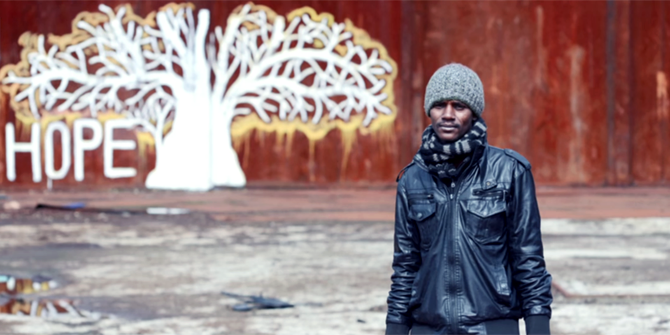
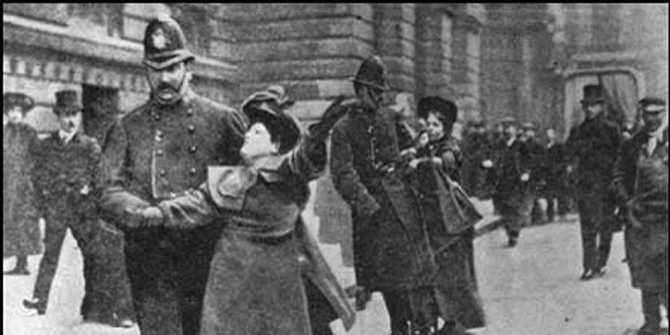
Can I get a Plain English version of this please?